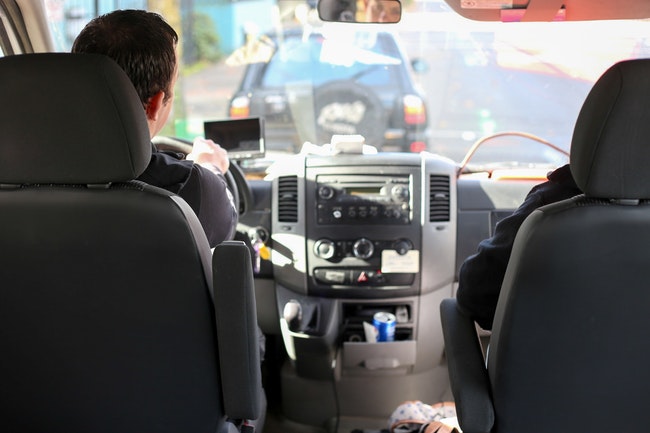Marion County may be months away from starting a program where mental health workers respond to some crisis calls instead of police.
The program would serve much of the city of Salem, though not west Salem, and comes after city councilors have said a mobile crisis program is badly needed. City efforts to create a Salem-specific team began in May 2021 after its budget committee voted to set aside $135,000 to start up a program, but have otherwise stalled due to a lack of funding.
County officials intend to use state money to create four mobile crisis response teams, each with a qualified mental health professional and a certified recovery mentor to help de-escalate people in crisis. The teams would respond to incidents with a low risk of harm to staff, according to Ryan Matthews, Marion County Health And Human Services administrator.
Most of the state money, $6.4 million, comes from the county’s allocation of Measure 110 funding. The 2020 ballot measure decriminalized possession of user quantities of street drugs and funneled more marijuana tax revenue into treatment programs. Counties can use money for a variety of programs, including mobile outreach.
The idea comes a year after county officials held back on creating a mobile crisis response unit separate from police. A program the city intended to run through United Way of the Mid-Willamette Valley received broad support from Salem residents, but county officials at the time said they preferred to focus on programs already in place through law enforcement.
Public agencies have increasingly viewed mobile crisis response as a more effective and affordable way to handle 911 calls related to mental illness, addiction and homelessness. A similar program in Eugene, CAHOOTS, has received national attention in recent years as more U.S. cities look for alternatives to law enforcement responding to mental health concerns.
Salem city councilors in September voted to ask city employees to identify funding sources for a city-specific mobile crisis team, but elected not to seek more state funding for a city effort.
Mayor Chris Hoy asked city staff to remove funding for a Salem-specific mobile crisis unit from the city’s list of legislative priorities during a Sept. 23 meeting of the city’s legislative committee, which included former Mayor Chuck Bennett and Councilors Jose Gonzalez and Virginia Stapleton.
During a Sept. 26 city council meeting, the council voted down an amendment from Councilor Vanessa Nordyke that would have added funding for a mobile crisis team back on the city list.
In an interview last week with Salem Reporter, Hoy said he stood by the vote because of the county funding included.
“The state has already funded mobile crisis, and when they already have a package out there they’re not likely to do a one-off for Salem just because we’re not involved,” he said. “The more things you ask them for, it dilutes your ask. You have to really decide what is your most important thing.”
He’s been in talks with Marion County officials about the program they have in the works and said it will offer better coverage for most of the city.
A pilot effort city councilors discussed in Salem would have included only one team of crisis responders, limiting their availability to 40 hours per week. The county program, by contrast, would have four teams.
Hoy acknowledged the county effort had some shortcomings — most notably, that it wouldn’t serve west Salem.
“That’s still work to be done,” he said.
Matthews said county officials were hesitant last year to pursue a mobile crisis response team through United Way because the city was considering including medical providers, something that’s part of the CAHOOTS program in Eugene.
“Under the Marion County umbrella, that isn’t our specialty,” he said. “We provide substance use treatment and mental health treatment and those sorts of things. But we don’t want to take on kind of a more physical health response to that. That’s where we would look to our EMTs or the hospital or to other health professionals.”
Hoy said he personally sees the absence of medical providers as less important than other councilors and said the teams would be able to help people with addiction and behavioral health issues.
“It’s not going to cost the city anything. It’s a game changer,” he said.
Nordyke, who has been a vocal supporter of a mobile crisis unit, said she welcomed the idea for the new civilian team.
She said she did have concerns about the lack of a medical response. “When people are in crisis, there’s often an untreated or undertreated medical condition that is happening at the same time,” she said. “So we won’t be able to reduce unnecessary emergency room visits, and it’s widely understood that Salem Health has one of the busiest emergency departments on the West Coast.”
Nordyke said she also believes the new program should have at minimum two teams dedicated to Salem.
“I’m sure four teams county-wide will have no shortage of things to do across the entire county,” she said. So it’s a great step in the right direction, but I need more information on whether they’re going to make Salem a priority.”
The new “community response teams” run by the county’s Health and Human Services Department will come in addition to the county’s existing mobile crisis response team, which pairs an officer with a qualified mental health professional.
Matthews said the county is now hiring for the new positions, which could take up to six months or more due to high demand, but the teams could start rolling out individually as the roles are filled.
“What we’ve found on the crisis side is about 90% of the people that we’re interacting with are also experiencing substance use disorders,” he said. “Having that certified recovery mentor there to supplement what we’re doing on the mental health side, we feel like, will give a really supportive response to people.”
Matthews said most of the calls would likely be routed to a mobile crisis unit by a dispatcher or through 988, a national hotline for suicide prevention and mental health crises created in July.
While the program will respond to calls county-wide, he said the majority of calls will likely come from Salem based on population and activity.
Polk County is working to add its own teams as part of a larger overhaul of its public health crisis response programs.
Dr. Noelle Carroll, director of Polk County Health Services, said Wednesday that Polk County officials are working to add three mobile teams with a qualified mental health professional and a certified peer support specialist or recovery mentor.
“We have already begun utilizing this team model as current staffing allows and anticipate this more fully developing over the next few months with additional workforce recruitment efforts,” she said in an email.
Polk County also has one mobile crisis response team that pairs police with crisis intervention training paired with a qualified mental health provider, according to Sheriff Mark Garton.
In addition to Measure 110 funds, Matthews said funding for the new “community response teams” includes $850,00 in mobile crisis dollars from the Oregon Health Authority.
He said it could cost the county roughly $1 million per year to run four teams.
Matthews said they will initially look to de-escalate situations where people are in crisis and then try to connect them with resources they need, such as rental assistance, food assistance or medication. Staff could also take the person to the Psychiatric Crisis Center, a 24-7 center on Salem Hospital’s grounds operated by the county’s Health and Human Services Department.
“We’re going to look to figure out, how can we help get their needs met and how can we assist them in sort of navigating the complex systems that are out there?” Matthews said.
Once the county fills positions for the four community response teams, he said they will be scheduled mostly during evening hours and weekend shifts.
“The overall schedule for mobile response will ensure that we have coverage 24/7/365 between our Mobile Crisis Response Teams and Community Response Teams. At least one of these teams will be on shift and available at all times,” he said in an email.
PRIOR COVERAGE
UPDATED: Salem City Council wants funding identified for mobile crisis response
Salem, United Way halt plans for mental health crisis responder program
Salem Budget Committee recommends funding for mobile unit to respond to crisis calls
‘You want a resolution as much as possible’: Six hours with Eugene’s mobile crisis intervention team
Contact reporter Ardeshir Tabrizian: [email protected] or 503-929-3053. Contact reporter Rachel Alexander: [email protected] or 503-575-1241.
JUST THE FACTS, FOR SALEM – We report on your community with care and depth, fairness and accuracy. Get local news that matters to you. Subscribe to Salem Reporter. Click I want to subscribe!












